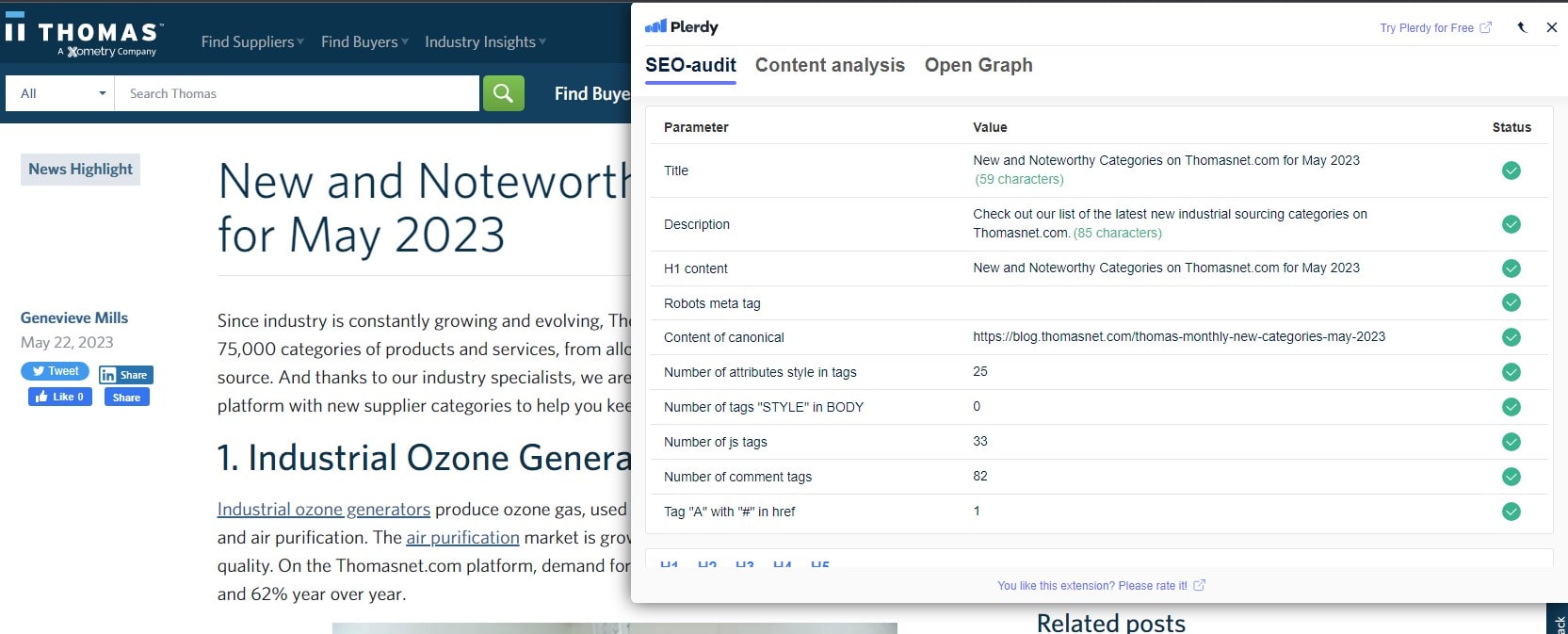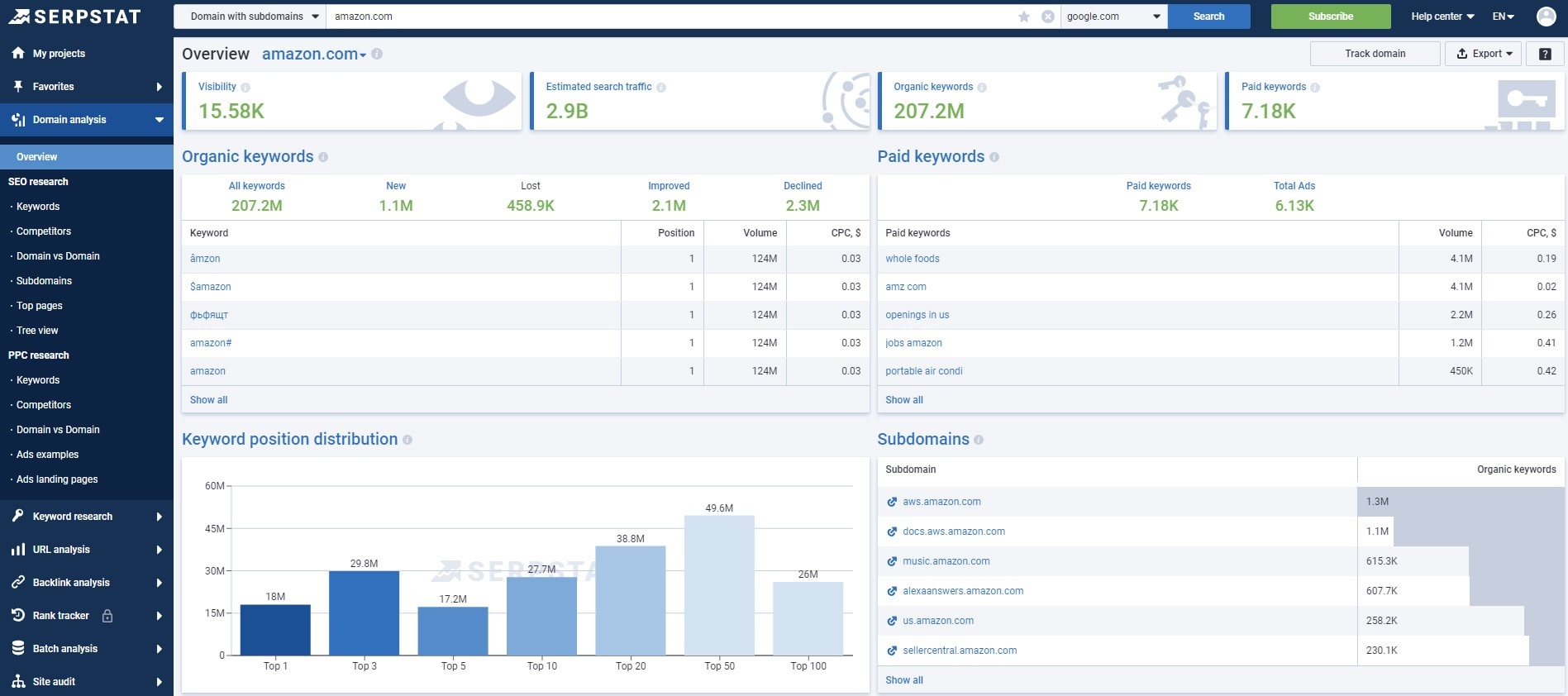Dive into the bustling marketplace with our dynamic article, “Marketing For Manufacturers: 6 Effective Strategies.” Here, we dissect crucial strategies to ensure your manufacturing business commands attention from discerning buyers without the typical marketing jargon. ⚡?
Our scope includes, but isn’t limited to:
- Defining your niche with a precision
- Personalizing your pitch to resonate with your target buyer
- Tactically leveraging social media platforms to reach potential customers
- Gearing content marketing to fit your manufacturing narrative
- Implementing comprehensive email marketing
- Utilizing Plerdy, a crucial tool for streamlining your SEO & UX efforts
Specifically, our discourse extends from the apparel industry, known for its rich tapestry of customization options, to the steel industry, renowned for its brute force and tenacity. Each narrative is illustrated with practical examples, magnifying your understanding of their application. You’ll soon appreciate the seamless blend of various strategies aimed at driving engagement, nurturing leads, and boosting sales.

Get ready to grasp the mechanics of marketing for manufacturers, and don’t forget to explore Plerdy to upgrade your SEO and UX efforts. Seize this opportunity to amplify your brand’s visibility and impact in the marketplace. Let’s elevate your manufacturing marketing strategies together! ⚡?
Introduction to Marketing for Manufacturers
Welcome to the marketing realm for manufacturers, a fascinating juncture where tradition meets innovation. Far removed from the generic storefront marketing, manufacturers encounter unique challenges – requiring custom strategies that center around their customer base, distinct processes, and the products they produce.
In the modern age, the journey towards successful marketing intertwines with the digital landscape. This isn’t just about embracing digital tools—it’s about integrating these technologies into your marketing approach to bolster customer relationships and enhance brand visibility.
Consider the manufacturing sectors of aerospace, automotive, and electronics. Each has unique customer profiles and distinct market dynamics. For instance, aerospace manufacturers might focus on B2B marketing, targeting airlines and government agencies. In contrast, automotive manufacturers might adopt a B2C approach, directing their campaigns towards end-users.
Here are a few core components of successful marketing for manufacturers:
- Tailored content that resonates with specific customer groups.
- A digital-first approach that leverages social media, email campaigns, and industry forums.
- Data-driven decision-making to optimize marketing performance.
In this dynamic landscape, manufacturers must dive headfirst into their marketing endeavors—navigating the digital realm, adapting to customer behaviors, and sculpting a brand that’s synonymous with quality and trust. Armed with effective strategies, you’ll pave the way for a robust manufacturer marketing blueprint that captures attention and drives business growth.
Understanding the Unique Marketing Needs of Manufacturers

Manufacturers sit at a distinctive crossroads in the business arena, where the streams of production and customer interaction intertwine. This unique position gives birth to specific marketing needs that are tailored to the complex landscape of manufacturing industries.
Understanding the customer—whether it’s a major organization in B2B or an end-user in B2C—is crucial. Companies specializing in heavy machinery, for instance, target decision-makers in construction firms, while those in apparel manufacturing focus their messaging on fashion-savvy consumers.
Accommodating these divergent customer profiles necessitates a bespoke approach to marketing. The common thread? The digital shift sweeping across all sectors, creating new avenues to engage customers and showcase products.
To illustrate, let’s unpack three key marketing needs of manufacturers:
- Niche-specific messaging: Communication in manufacturing marketing must mirror the industry’s language, issues, and trends. Pharmaceutical manufacturers, for instance, need to convey complex information about drug efficacy and regulations in a simple, engaging manner.
- Robust digital presence: In today’s connected age, a manufacturer’s digital footprint serves as a beacon for potential customers. Leveraging social media, blogs, and industry-specific online forums can amplify reach and foster deeper customer connections.
- Building trust through transparency: Sharing insights into the manufacturing process, quality control measures, and sustainability efforts can cement a manufacturer’s reputation as a trustworthy, responsible entity.
Meeting these unique needs requires manufacturers to don a marketer’s hat—devising strategies that meld customer-centricity with their intricate operational aspects. By doing so, they pave the path for a compelling narrative that bolsters brand recognition, fosters customer loyalty, and, ultimately, fuels business growth.
Digital Transformation and Marketing in Manufacturing
In the contemporary business ecosystem, digital transformation in manufacturing does more than streamline operations—it acts as a catalyst for powerful, impactful marketing. This intersection of the digital worlds brings forth unique opportunities for manufacturers to engage their customers, increase their brand visibility, and foster deeper connections.
Let’s consider food manufacturing. With the digital revolution, a food manufacturer can leverage augmented reality (AR) to provide customers with virtual tours of their production facilities, creating an immersive experience showcasing their commitment to quality and safety.
Meanwhile, in automotive manufacturing, car makers can employ virtual reality (VR) and 3D modeling to provide potential buyers with interactive experiences of their models. Customers can customize vehicle features, take virtual test drives, and get a comprehensive understanding of the product—right from the comfort of their homes.
Here are the key facets of the digital transformation influencing marketing in manufacturing:
- Interactive Customer Experiences: From VR tours to interactive product demos, digital tools are elevating the customer experience, making it more engaging and personalized.
- Data-Driven Marketing: Big data and analytics help manufacturers understand customer behavior, preferences, and trends, which improves marketing strategies.
- Direct Customer Engagement: Social media platforms, blogs, and digital forums have opened up direct communication channels with customers, facilitating real-time feedback and stronger relationships.
- Increased Brand Visibility: Through a robust digital presence, manufacturers can amplify their reach, capture a wider audience, and boost their brand recognition.
Embracing digital transformation doesn’t merely represent a technological shift—it marks a radical reimagining of how manufacturers engage their customers and market their products. And as this digital wave continues to ripple through the manufacturing landscape, those who ride it successfully will gain an edge in the competitive market.
Strategy 1: Content Marketing in the Manufacturing Sector

Content marketing—a strategic method of creating, distributing, and leveraging valuable content—has emerged as a pivotal player in the manufacturing sector’s marketing playbook. By delivering content that resonates with customers’ needs and aspirations, manufacturers can build stronger relationships, bolster brand recognition, and, ultimately, drive growth.
An electronics manufacturer, for example, can use content marketing to demystify complex technical concepts. They can craft engaging articles, infographics, or videos that shed light on how their products work, how they contribute to technological advancements, or how they align with sustainability trends.
Similarly, a company specializing in industrial machinery might develop in-depth case studies or white papers. This content could delve into the performance of their equipment in different industries, providing potential customers with tangible proof of their products’ reliability and efficiency.
Here are some key components of a successful content marketing strategy in the manufacturing sector:
- Customer-Centric Content: Understanding the audience is vital. Content should provide solutions, insights, or information that customers find useful and valuable.
- Multimedia Approach: Engaging text, infographics, videos, podcasts—diversifying the content format increases its appeal and accessibility.
- Consistent Delivery: Regularly publishing content keeps the brand fresh in the customers’ minds and reinforces its position as a trusted source of information.
- Promotion Across Digital Channels: Effective content distribution, be it via a company blog, social media, email newsletters, or industry forums, ensures maximum visibility and reach.
- Performance Tracking: Analyzing content performance provides insights to fine-tune strategies and maximize their effectiveness.
A robust content marketing strategy serves as a bridge, connecting manufacturers with their customers in a meaningful, enduring manner. In the digital age, it’s not enough to produce superior products—manufacturers must also craft compelling narratives that encapsulate the value they offer. By doing so, they can transform casual visitors into loyal customers and customers into enthusiastic brand advocates.
Strategy 2: Search Engine Optimization (SEO) for Manufacturers

Diving headfirst into the vibrant digital ocean, manufacturers find themselves amidst an ever-increasing tide of online content. Here, the role of Search Engine Optimization (SEO) morphs from a mere strategy into a necessity—an indispensable compass guiding customers to their digital doorstep.
Take, for example, a steel manufacturer. By optimizing their online content with targeted keywords such as “high-grade stainless steel,” “corrosion-resistant steel,” or “steel supplier,” they can boost their visibility on search engine results. When potential buyers use these terms in their searches, the manufacturer’s content rises to the surface, capturing attention and driving traffic to their website.
The medical equipment manufacturing sector offers another case in point. Implementing SEO with industry-specific keywords—think “ultrasound device manufacturer” or “orthopedic equipment supplier”—can place these manufacturers on the radar of hospitals, clinics, and medical institutions looking for such products.
Key elements of a well-crafted SEO strategy for manufacturers include:
- Keyword Research: Identify and integrate relevant keywords that potential customers are likely to use in their searches.
- On-Page SEO: Optimize website elements such as titles, meta descriptions, and image alt text to improve search engine visibility.
- Quality Content: High-quality, relevant content that integrates keywords naturally and provides value to the reader is essential.
- Backlinks: High-quality links from reputable sites can boost a website’s credibility and its position in search engine rankings.
- Technical SEO: Ensuring a fast, mobile-friendly, and easily navigable website enhances user experience and favorably impacts SEO.
By implementing effective SEO strategies, manufacturers can shine a spotlight on their products and services, standing tall amidst a sea of competitors. Beyond driving website traffic, SEO fosters brand recognition and credibility—establishing the manufacturer as a trustworthy authority in their niche. In the vast, interconnected digital landscape, SEO equips manufacturers with a powerful tool to reach their customers, share their unique value proposition, and foster strong, enduring relationships.
Strategy 3: Social Media Marketing for Manufacturers

Social media has given manufacturers a powerful megaphone to spread their message worldwide. Social media marketing serves as a catalyst, facilitating conversations between manufacturers and their customers, nurturing relationships, and strengthening brand loyalty.
For instance, a furniture manufacturer can utilize Instagram’s visually rich platform to showcase their product portfolio. High-quality images and videos of their elegant furniture designs can spark interest, foster engagement, and convert followers into customers.
On the other hand, an aerospace parts manufacturer might leverage LinkedIn to connect with potential B2B customers. By sharing insightful articles or industry news, they can establish themselves as thought leaders in their field, attracting more business partners and clients.
Here are some essential components of a compelling social media marketing strategy for manufacturers:
- Platform Selection: Identifying the most effective social media platforms for a manufacturer’s target audience is paramount. This could be Instagram for B2C or LinkedIn for B2B, among others.
- Content Strategy: Crafting engaging, relevant content—from product showcases to behind-the-scenes glimpses, industry insights, or customer testimonials—can make a brand more relatable and trustworthy.
- Engagement: Promptly responding to comments, messages, or reviews builds rapport with customers and projects an image of a responsive, customer-focused manufacturer.
- Consistency: Regular, consistent posts keep a manufacturer’s brand at the forefront of customers’ minds and foster stronger connections.
- Performance Tracking: Monitoring key metrics such as likes, shares, comments, and follower growth can provide valuable insights to fine-tune the strategy.
A dynamic social media presence enables manufacturers to narrate their brand story in a personable, engaging manner. It allows them to not just talk at their customers but converse with them—deepening customer relationships and enhancing their brand image. Social media marketing can boost a manufacturer’s consumer base, brand loyalty, and bottom line.
Strategy 4: Email Marketing for Manufacturing Businesses

In the bustling digital marketplace, email marketing stands as a stalwart—offering manufacturers a direct line of communication to their customers. Tailored and timely, email marketing can catalyze customer engagement, boost brand loyalty, and stimulate sales growth.
Imagine a plastic injection molding manufacturer rolling out a novel, eco-friendly product line. They could harness the power of email marketing to reach out to their existing customer base—announcing the launch, explaining the benefits of the products, and perhaps even offering a limited-time discount to spur initial sales.
Similarly, an auto parts manufacturer could leverage email marketing to nurture relationships with their B2B clients. Regular updates on product enhancements, industry trends, or even regulatory changes can position the manufacturer as a valuable partner, not just a supplier.
Key considerations for an effective email marketing strategy in manufacturing include:
- Segmentation: Splitting the email list into different categories—based on factors like purchase history, customer type (B2B or B2C), or location—allows for more personalized, relevant communication.
- Content: Engaging, value-added content—product updates, educational materials, industry insights—can deepen customer relationships and promote brand loyalty.
- Call to Action: Each email should include a clear, compelling call to action, guiding the recipient on the next steps.
- Optimization: Emails should be optimized for mobile viewing, given the growing trend of checking emails on smartphones.
- Analysis: Monitoring key metrics like open rates, click-through rates, and conversion rates can provide insights to refine the strategy.
Email marketing allows manufacturers to stay connected with their customers, even when they aren’t actively shopping. It’s a potent tool for relationship-building, customer retention, and even customer acquisition. When done right, email marketing can drive significant value for manufacturers, fostering strong customer relationships and boosting the bottom line.
Strategy 5: Trade Show Marketing for Manufacturers

Trade show marketing offers manufacturers a stage to spotlight their products and capabilities—creating tangible experiences that digital channels can’t replicate. It’s a powerful platform for manufacturers to interact with potential customers, demonstrate product benefits, and establish strong industry connections.
Consider, for example, a robotics manufacturer participating in an industry trade show. Their exhibit, featuring live demonstrations of their robotic arms performing complex tasks, would be far more impactful and memorable than mere descriptions or pictures on a website.
For a manufacturer specializing in heavy machinery, a trade show provides an opportunity to present their machines in action, allowing potential clients to appreciate the efficiency and quality of their equipment first-hand.
A robust trade show marketing strategy should encompass:
- Pre-show Promotion: This can include announcing participation via email marketing, social media posts, or even targeted ads to create buzz and drive booth traffic.
- Exhibition Design: An eye-catching, engaging booth setup can draw attendees in, while live demonstrations or interactive exhibits can hold their interest.
- Staff Training: Ensuring the staff is well-versed in product details, key selling points, and customer handling techniques can make interactions more productive and satisfying.
- Post-show Follow-up: Timely follow-ups with booth visitors—sharing additional information, answering queries, or simply thanking them for their visit—can keep the brand top-of-mind and foster ongoing relationships.
- Measurement: Tracking key metrics—like booth traffic, leads generated, or deals closed—can help evaluate the success of the trade show participation and inform future strategies.
Trade show marketing provides manufacturers a unique avenue to engage with their target audience, showcase their product prowess, and build brand recognition. While it requires significant planning and investment, the returns—in terms of customer relationships, brand visibility, and potential sales—can be well worth the effort. Manufacturers should embrace trade shows as an essential part of their marketing toolkit, carefully integrating them with their digital marketing efforts to achieve the best results.
Strategy 6: Utilizing Marketing Technology for Enhanced Performance

Embracing marketing technology can elevate manufacturers’ strategies, making them more efficient and targeted. With a diverse range of tools available, marketing efforts can be streamlined, automated, and enhanced, providing better connections with the customer base while optimizing resource usage.
Suppose an automotive parts manufacturer adopts a customer relationship management (CRM) platform. This software could harmonize sales and marketing efforts—keeping track of customer interactions, maintaining a centralized database of customer information, and triggering personalized email campaigns based on customers’ behaviors and preferences.
Meanwhile, a company specializing in eco-friendly packaging might utilize a social media management tool. This application would allow them to schedule posts, monitor their brand mentions, and engage with their audience in real-time—promoting brand visibility and establishing a strong online presence.
Integrating marketing technology into their strategy can offer manufacturers benefits such as:
- Efficiency: Automation tools can manage repetitive tasks—like email responses or social media posts—freeing up valuable time for strategic thinking and creativity.
- Precision: Advanced analytics tools offer insights into customer behaviors, preferences, and trends, enabling more precise and effective targeting.
- Personalization: Tools like CRM systems allow for customization of messages, ensuring the communication is relevant and engaging for each individual customer.
- Engagement: Social media management tools can amplify the brand’s digital presence and foster interaction with the target audience.
- Measurement: With the right tools, every marketing action can be tracked, measured, and analyzed, providing valuable data to inform future strategies.
Marketing technology, combined with the traditional marketing methods, can form a powerhouse strategy for manufacturers. It’s about optimizing resources, personalizing customer interactions, and delivering impactful messages in the right place and at the right time. A smart blend of technology and creativity can set manufacturers on the path to achieving robust, sustainable growth.
Case Studies: Successful Marketing Strategies in Manufacturing
Successful marketing strategies can propel manufacturers to the forefront of their industries, fostering robust growth and customer loyalty. Let’s delve into the experiences of two different manufacturers to understand the transformative power of effective marketing.
First, consider Acme Corp., an industrial machinery manufacturer. They tackled their marketing challenge with a comprehensive content strategy. They established themselves as thought leaders in their niche by crafting engaging, educational materials – such as white papers, blog posts, and video tutorials. Offering value to their customers, they simultaneously nurtured relationships and attracted potential buyers.
Key components of Acme Corp.’s strategy included:
- Crafting a regular blog addressing industry trends and best practices
- Producing instructive video content for social media channels
- Creating downloadable resources, providing value to the customer while generating leads
On the other side of the spectrum, let’s reflect on GreenPack, a sustainable packaging manufacturer. They utilized social media marketing to establish their brand and connect with their environmentally conscious customer base. Through engaging posts, active community involvement, and customer testimonials showcasing their eco-friendly products, they drove brand awareness and customer loyalty.
GreenPack’s dynamic strategy featured:
- Showcasing their products via visually engaging Instagram posts
- Highlighting customer testimonials and success stories
- Participating in relevant social media conversations, positioning themselves as a leader in sustainability
Both Acme Corp. and GreenPack tailored their strategies to their unique customer needs and industry norms, using digital platforms to effectively reach and engage their target audiences. By focusing on providing value, fostering relationships, and utilizing the power of digital marketing, they boosted their brand profiles, cultivated loyal customers, and drove significant growth. It’s clear that when manufacturers align their marketing strategies with their customer’s interests and needs, they can unlock remarkable success.
The Future of Marketing for Manufacturers

In the world of manufacturing, the future of marketing sparks an era of unprecedented possibilities. Tides are shifting – strategies that brought success in the past won’t necessarily guarantee victories tomorrow. Manufacturers, ready to ride the wave of change, gear up for an exciting future.
Customer expectations keep evolving with advancements in digital technology. The shift demands manufacturers to adopt marketing strategies that can not only match but exceed these expectations. Savvy manufacturers should start leveraging predictive analytics, smart automation, and AI-driven insights to refine their marketing strategies and deliver an unmatched customer experience.
Opportunities that lie ahead:
- Harnessing AI: AI-powered tools help in refining customer segmentation, personalizing the customer journey, and even predicting future trends. Manufacturers can offer a personalized experience that nurtures stronger customer relationships.
- Using Predictive Analytics: Deep customer insights can now be gained, analyzing past behavior to predict future needs. By identifying patterns, manufacturers can stay one step ahead of customer demands and create product offerings that fit like a glove.
- Embracing Automation: From email marketing campaigns to social media updates, automation makes marketing more efficient. Manufacturers can effortlessly approach clients at the correct time with the right message.
Next-gen manufacturers, such as ElectronCo, are already using AI to identify untapped markets and provide personalized experiences to their customers. By analyzing customer data, ElectronCo anticipates needs and tailors offerings – a future-forward strategy that maximizes customer satisfaction and loyalty.
In another example, PionPack, a leader in packaging, utilizes automation in its email marketing to nurture leads and keep customers engaged. Automated yet personalized emails sent at key stages of the customer journey have skyrocketed their conversion rates.
The days of marketing with a single approach that worked for everyone are over. The future holds a more nuanced, tailored approach where manufacturers don’t just meet customer needs – they anticipate them. Riding on the waves of AI, predictive analytics, and automation, the future of marketing in manufacturing paints a picture of endless possibilities. The goal is clear – creating value for customers at every touchpoint of their journey.
Bottom Line
Strategically positioning your business in the manufacturer’s market, you’ve come full circle with our comprehensive guide, “Marketing For Manufacturers: 6 Strategies”. Intense competition is no stranger in the manufacturing landscape; hence, keeping a finger on the pulse of modern marketing is pivotal to gaining a competitive edge. ⚡?
An eloquent narrative that resonates with your target buyers and communicates your unique value proposition can open doors to incredible opportunities. Use Plerdy’s tool for a free trial of insightful SEO & UX analysis. It’s an expert-approved choice that will help you analyze your web pages and strategize to meet your business goals.
The journey to better marketing strategies is a marathon, not a sprint—every little effort counts. From harnessing the power of inbound marketing to honing your advertising sign language, every step you take strengthens your manufacturing business’s foundation.
As we wrap up, don’t forget to reap the benefits of consistent marketing efforts. Let your business shine bright in the race to the top. Celebrate each win, learn from the setbacks, and never stop evolving! ⚡?
